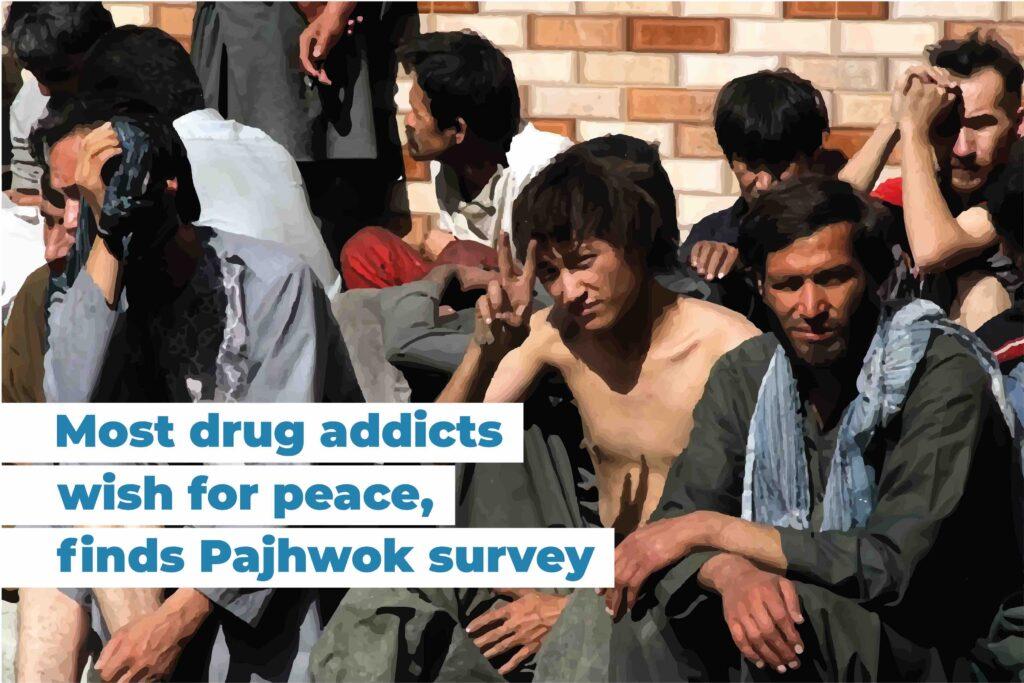KABUL (Pajhwok): A Pajhwok Afghan News survey shows 70 percent of drug addicts say they slipped into addiction due problems generated by the country’s long-running conflict and almost all of them want peace for their own survival.
No survey has been conducted so far to identify the exact number of drug addicts in Afghanistan, but a survey in 2015 found that 3.6 million people or 11 percent of the country’s population are addicted to drugs.
Pajhwok launched a survey from January 8 to January 20 in Kabul, Farah, Herat, Kandahar, Nangarhar and Balkh provinces and interviewed 130 drug addicts about peace in Afghanistan.
Of the interviewees, all of them men, 58 said they were uneducated, 21 percent said they were school graduates, 18 percent attained secondary education and two percent others have 14 years of education.
The respondents were aged between 18 and 60 years and they belonged to 24 provinces but currently live in the mentioned six provinces. Most of these people live away from their homes in parks and other areas in cities.
Sixteen of these men are native residents of Nangarhar, 15 each of Balkh and Kandahar, 14 were from Farah, 11 from Kabul, nine from Herat and 18 others form other provinces. Thirty of these individuals were interviewed in Kabul and 20 each in other provinces.
“Do you want the conflict to stop and peace established? How peace is important for Afghans, particularly for drug addicts? What problems forced you to become addict? What you want from the government, were questions asked from the respondents in the survey.
We want peace!
Drug addicts who live in dirty environment and dirty clothes in capital Kabul and other parts of the country are believed to be only thinking about drugs, but the survey found it wrong as they had painful stories and they regarded the war as the main factor of their miseries.
Jamshid, 26, a resident of Baghlan province who currently lives under dirty quilts in Bagh-i-Omomi area of Kabul alongside with other drug addicts, said he also wanted peace.
“I am not happy living here, if I was on job and there was peace, why would I live here in this cold,” he said.
Sheer Agha, 32, another drug addict with shaggy hairs who lives in Kabul, also said that he wanted peace.
“I do not want to have a job, but I want peace because I want my country to become stable, if the war continues, it would cause hundreds of other youths to become addicted to drugs and their will destroy,” he said.
Rafiullah, 24, another drug addict from Logar province, responded with a lump in throat when asked whether he wanted peace. “Peace? Who is against peace, are there people in the world who deny peace,” he said.
Peer Mohammad, another addict from Farah resident, said he did not want peace as it had no importance for him. He asked the government to cure him. “If I am rehabilitated and live with my children, it is peace for me,” he said.
Importance of peace:
Of the respondents, 94 percent said peace was very important, two percent said it was less important while four percent others said it was not important.
Ghulam Seddiq, a resident of Farah province who has been consuming drugs for years, said his mental focus was undamaged and he knew the importance of peace.
He said peace was important not only for him, but all Afghans because it would make everything better in Afghanistan.
Hamidullah, a resident of Kapisa province, also said peace was important. “If there is peace, I will find a job. As I am jobless, I have to steal things and even stab people, I do it only due to joblessness and to find something to purchase drugs,”
Mir Ahmad, 27, another drug addict from Farah province, said that not peace but treating addicts like humans was important for them.
Abdul Majid from Herat province, who lives with drug addicts in the provincial capital, also said that peace was not important for addicts.
He said the government should create jobs for drug addicts because they consumed drugs due to joblessness.
Conflict legacy — a reason behind drug addiction:
Seven of every 10 participants of the survey say unemployment, economic problems, migration and disabilities caused by the conflict have forced them to use drugs while three said they developed the habit in company of friends.
Faridon, a resident of Bamyan province and a drug addict who collects waste and garbage from every shop in Muradkhanio area of Kabul City, said he had spent 18 years in Iran where he did not consume drugs but started using drugs in his own country due to unemployment.
He termed the ongoing conflict as main reason behind drug addiction in the country and said: “Afghanistan doesn’t have an owner, had this country a leader, there would have not been unemployment to this extent,” he said.
Mohammad Shoiab, 40, another drug addict from Ghazni province, said he migrated to Iran with his family due to conflict in Afghanistan and spent many years there. He said in Iran difficulties forced him to get addicted to drugs. Referring to his addiction, Shoiab said: “I brought this problem — drug – from Iran, with myself,” he said.
Noorullah,25 ,is a drug addict who lost his one leg in a blast. He narrated unpleasant stories from his life and said: “After I got disabled, I had no job and my problems and difficulties increased every day and finally I turned to drugs. The government should work for peace so people are able to improve their lives instead of turning to drugs.”
There are some individuals who said they got addicted to drugs due to bad friends.
Nangyalai, 31, a resident of northern Baghlan province was walking in Muradkhanio area of Kabul City along with other drug addicts. He was somehow clean and looked normal. But he complained about bad friends. He said he served as a company commander in Paktia and got 18,000 salary but one of his friends who was addicted to drugs, encouraged him to use hashish thus he was removed from his job due his addiction.
When asked about his family, the young addict said he got married and had two sons but was unable to return to home in the past two years due the stigma of drug addiction.
Want peace, jobs and treatment
Seven of every 10 surveyed individuals said they wanted peace and jobs but three more demanded treatment from the government.
Nazar Jan, a resident of Uruzgan province who is addicted to drugs, said: “My time has passed, the government should bring peace first and then ban drugs so that more youth in future are not addicted to drugs,” he said.
Saleh Mohammad, another drug addict from Nangarhar province, asked the government and the Taliban to reconcile and added it was vital that the government should generate jobs for people so they avoid drugs.
Anbya, 46, another participant of the survey from Baghlan province, said two of his addicted friends died under the Yakpasagi bridge in Kabul City during the past two days.
Anbya, who saw his friends dying, was worried and asked the government for treatment. “I know everything, I remember my family and children and also know that one day I will die due to severe cold like my friends,” he said.
War turns society unhealthy which brings up drug addicts:
Kabul University teacher Sharafuddin Azemi said the long running Afghan conflict had resulted in different economic, security and social issues.
“When there is insecurity and conflict in a society, education and primary needs of the country could not be achieved and society grows unhealthy thus drug addiction and other issues generate.”
“When there is peace and stability, no one would be forced to go out of the country for work. Addicted people will be able to treat themselves and live like other ordinary people of the society,” he said.
He said healthy persons never get addicted to drugs. “If there is peace and stability in a society, no one would become addicted to drugs because addiction happens when someone wants peace. “








GET IN TOUCH
NEWSLETTER
SUGGEST A STORY
PAJHWOK MOBILE APP